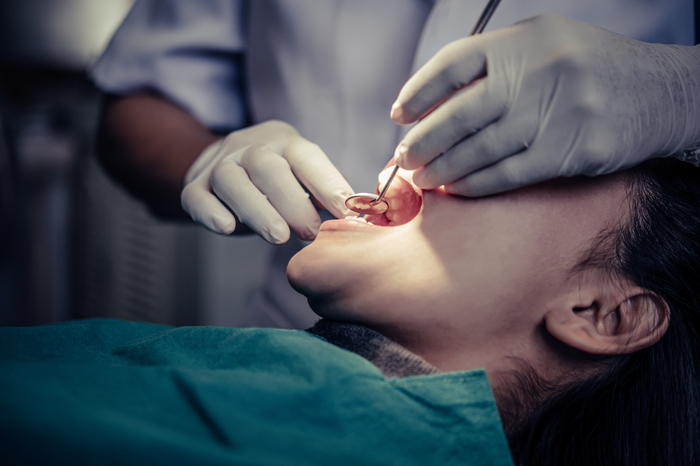A dental abscess is a severe and potentially life-threatening condition characterized by a pocket of pus that forms in or around a tooth due to a bacterial infection, according to the American Dental Association (ADA). They note that if left untreated, a dental abscess can lead to significant health complications, including the spread of infection to other parts of the body, such as the jaw, neck, or even the brain. It can also result in tooth loss, severe pain, and systemic issues like fever and malaise. Understanding the symptoms and seeking prompt dental care is crucial to prevent these serious health risks.
What Is a Dental Abscess?
A dental abscess is a localized collection of pus caused by a bacterial infection within the tooth, gums, or the surrounding bone, according to the American Association of Endodontists. They note that it typically occurs when bacteria invade the dental pulp—the innermost part of the tooth containing nerves and blood vessels—due to untreated cavities, periodontal disease, or dental trauma. The infection leads to inflammation and the formation of pus, which creates a painful, swollen area that can be visibly noticeable or hidden beneath the gum line, according to the ADA.
The American Dental Association also notes that there are different types of dental abscesses, including periapical abscesses, which occur at the tip of the tooth root, and periodontal abscesses, which develop in the gums beside a tooth root. Regardless of the type, a dental abscess is a serious condition that requires prompt medical attention to prevent the spread of infection and to alleviate pain. If left untreated, the infection can extend to other parts of the body, leading to more severe health complications.
Symptoms of a Tooth or Gum Abscess
A dental abscess can present with a variety of symptoms that signal the presence of an infection and the need for urgent dental care, according to the CDC. They note that recognizing these symptoms early can help prevent the spread of infection and mitigate more serious health complications.
Some common signs and symptoms associated with a tooth or gum abscess, according to the CDC, include:
-
Severe toothache that may radiate to the jawbone, neck, or ear
-
Sensitivity to hot or cold temperatures and pressure
-
Fever and general malaise
-
Swelling in your face, cheek, or neck
-
Swollen, red gums or a visible bump on the gums
-
Bad breath or an unpleasant taste in your mouth due to the pus drainage
How Are Dental Abscesses Treated?
Treating a dental abscess typically involves addressing the infection, alleviating pain, and preventing further complications, according to the ADA. They explain that the primary goal is to eliminate the source of the infection and drain the abscess to relieve pressure and discomfort. Depending on the severity of the abscess and the extent of the infection, various treatment options may be employed by dental professionals.
One common treatment for a dental abscess is drainage, which involves making a small incision in the abscess to allow the pus to escape, thereby reducing pressure and pain, according to the ADA. They note that this procedure is often followed by cleaning the area thoroughly to remove any remaining bacteria. In cases where the abscess is linked to a decayed or damaged tooth, a root canal may be performed to remove the infected pulp and seal the tooth to prevent further infection. If the tooth is severely damaged and cannot be saved, extraction may be necessary to eliminate the source of the infection.
In addition to these procedures, dental professionals may also recommend certain lifestyle changes and home care practices to support healing and prevent recurrence, according to the ADA. This can include maintaining good oral hygiene, using antiseptic mouthwashes, and avoiding foods and drinks that may irritate the affected area. Regular dental check-ups are also crucial to monitor oral health and address any issues promptly.
Dental Abscess Medication
Medications play a vital role in treating dental abscesses, particularly in managing infection and alleviating pain, according to the ADA. They explain that antibiotics are commonly prescribed to combat bacterial infection and prevent it from spreading to other parts of the body. Common antibiotics used for dental abscesses include amoxicillin, metronidazole, and clindamycin, according to the ADA. The choice of antibiotic and the duration of treatment depend on the severity of the infection and the patient's medical history.
Pain management is another critical aspect of treating a dental abscess, according to the ADA. Over-the-counter pain relievers such as ibuprofen or acetaminophen may be recommended to reduce pain and inflammation. In some cases, stronger prescription pain medications may be necessary to manage severe pain, according to the ADA. Additionally, dentists may suggest using warm salt water rinses to help reduce discomfort and promote healing.
It's important for patients to follow their dentist's instructions carefully when taking medications, including completing the full course of antibiotics even if symptoms improve. Proper medication adherence ensures that the infection is fully eradicated and reduces the risk of recurrence. Regular follow-up appointments with the dentist are also essential to monitor progress and address any ongoing concerns.
Causes of a Dental Abscess
Understanding the causes of a dental abscess is crucial for both prevention and effective treatment, according to the ADA. They explain that dental abscesses occur when bacteria penetrate the dental pulp or gum tissue, leading to an infection that results in the accumulation of pus. Several factors can contribute to the development of a dental abscess, often stemming from poor oral hygiene or untreated dental issues.
Below are some common causes that may lead to a dental abscess, according to the ADA:
-
Untreated cavities: When cavities are left untreated, they can progress deeper into the tooth, eventually reaching the dental pulp and causing an infection.
-
Gum disease: Periodontal diseases such as gingivitis and periodontitis can cause the gums to recede, creating pockets where bacteria can accumulate and lead to an abscess.
-
Dental trauma: Injuries to the teeth or gums, such as cracks, chips, or fractures, can provide an entry point for bacteria, increasing the risk of infection and abscess formation.
Prevention
Preventing a dental abscess involves maintaining good oral hygiene and taking proactive measures to protect your teeth and gums from infection, according to the CDC. By adopting healthy dental practices and being vigilant about your oral care routine, you can significantly reduce the risk of developing a dental abscess.
Below are some key suggestions to help prevent this painful condition, according to the CDC:
-
Brush your teeth regularly: Brush at least twice a day with fluoride toothpaste to remove plaque and food particles that can lead to cavities and gum disease.
-
Use dental floss: Floss daily to clean between your teeth and under the gumline where your toothbrush can't reach, helping to prevent the buildup of plaque and bacteria.
-
Replace your toothbrush every 3 to 4 months: A worn toothbrush is less effective at cleaning your teeth, so replace it regularly to ensure optimal oral hygiene.
-
Regular dental check-ups: Visit your dentist at least twice a year for professional cleanings and examinations to catch and treat any dental issues early.
-
Limit sugary foods and drinks: Reducing your intake of sugar helps prevent cavities, which can lead to infections and abscesses if left untreated.
FAQs
What is a dental abscess?
A dental abscess is a severe condition where a pocket of pus forms in or around a tooth due to a bacterial infection.
What are the symptoms of a dental abscess?
Symptoms can include severe toothache, sensitivity to temperature and pressure, fever, swelling in the face or neck, and bad breath.
How is a dental abscess treated?
Treatment typically involves addressing the infection, alleviating pain, and preventing further complications. This can include drainage of the abscess, a root canal, or tooth extraction.
What can cause a dental abscess?
Dental abscesses can be caused by untreated cavities, gum disease, or dental trauma which allow bacteria to penetrate the dental pulp or gum tissue.
How can I prevent a dental abscess?
Prevention involves maintaining good oral hygiene, regular dental check-ups, and limiting intake of sugary foods and drinks.
Can a dental abscess cause bad breath?
Yes, one of the symptoms of a dental abscess is bad breath, often caused by the bacterial infection.
Can a dental abscess cause fever?
Yes, a dental abscess can cause systemic issues like fever as the body tries to fight off the bacterial infection.
Is a dental abscess a serious condition?
Yes, a dental abscess is a serious condition that requires immediate medical attention to prevent severe health complications.











